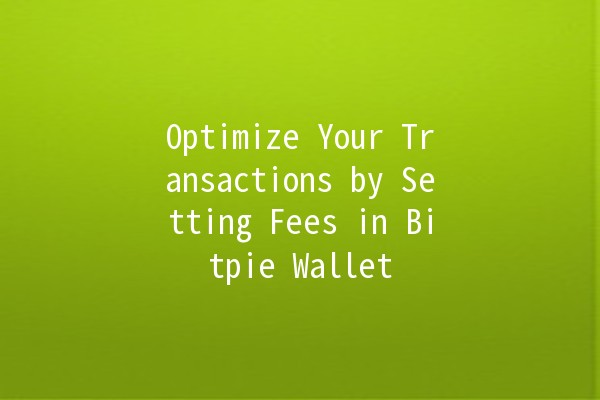
When it comes to managing cryptocurrency transactions, users often overlook one critical aspect: transaction fees. If you're using Bitpie Wallet, understanding how to optimize these fees can significantly enhance your overall trading experience. This article provides practical tips and tricks for setting transaction fees in Bitpie Wallet to ensure you're getting the most out of your crypto endeavors.
Understanding Transaction Fees in Bitpie Wallet
Before diving into the specifics of fee optimization, let's take a moment to understand what transaction fees are and how they work within Bitpie Wallet.
Transaction fees are payments made to miners in the blockchain network for processing and confirming your transactions. These fees can vary based on the network's congestion, the amount of data your transaction requires, and how quickly you want the transaction to be confirmed.
Why Optimize Your Transaction Fees?
Optimizing your transaction fees can lead to several benefits:

With these benefits in mind, here are five solid tips for optimizing your transaction fees in Bitpie Wallet.
Tip: Keep an eye on network congestion to decide when to make transactions.
When the blockchain network becomes busy, transaction fees can spike. You can use blockchain explorers or fee estimator tools to monitor current fees and network conditions. For example, when the Bitcoin network faces congestion, fees can increase, making it a less ideal time to transact unless you're willing to pay those higher fees.
Application Example: If you're planning on making a transaction, check the average fees on a site like mempool.space. If it’s lower than usual, it’s an excellent time to execute your trade!
Tip: Utilize the option to set custom fees for your transactions in Bitpie Wallet.
Bitpie Wallet allows users to customize transaction fees. This feature is crucial for avoiding unnecessarily high fees imposed by default settings. By adjusting the fee according to your needs, you can save money.
Application Example: If you need an urgent transaction, you can increase the fee slightly to prioritize it in the next block. Conversely, for nonurgent transactions, you might choose a lower fee to save costs.
Tip: Take advantage of Bitpie Wallet's features to automate fee settings based on transaction urgency.
Some wallets offer automated settings based on the speed required for the transaction. By selecting a "Standard," "Priority," or “Economy” option, users can let the wallet choose the most appropriate fee based on current network conditions.
Application Example: For scheduled transactions (like buying on certain dates), set the wallet to automatically pick the best fee option to ensure costeffectiveness without the need for constant monitoring.
Tip: Learn to identify and avoid peak hours for network use.
Blockchain networks can become congested at certain times, such as weekends or major market events. By timing your transactions for offpeak hours, you can benefit from lower fees and faster processing times.
Application Example: If you notice a trend that weekends lead to higher fees in the blockchain, plan your transactions for weekdays when volumes may be lower.
Tip: Leverage external fee estimation tools to help guide your fee setting.
Websites and tools designed to provide realtime transaction fee estimates can be immensely helpful. These tools analyze the network's current status and suggest optimal fees for timely processing.
Application Example: Before making a significant transaction, consult tools like Bitcoin Fees or EasyBlock. Adjust your Bitpie fees based on their recommendations to ensure you’re getting the best deal.
Common Questions About Transaction Fees in Bitpie Wallet
The average transaction fee can vary based on network congestion. A Bitcoin transaction could range from a few cents to several dollars. Monitoring the fee estimation tools can give you a clearer picture of current average fees.
No, once a transaction is broadcast to the network, you cannot change the fee. The only option afterward is to wait for the transaction to be confirmed or crafted a new one with a higher fee to outpace the previous transaction.
Bitpie Wallet calculates transaction fees based on network demand and the size of the transaction data. Currently, the wallet recommends fees based on these variables, but users have the option to set custom fees.
Setting a transaction fee too low may delay your transaction or cause it to remain unconfirmed. In some cases, it may eventually be dropped from the network entirely, requiring you to resend it with a higher fee.
No, transaction fees on Bitpie Wallet are not fixed. They fluctuate based on network demand and conditions. Users can set custom fees to suit their urgency and needs.
Before confirming a transaction in Bitpie Wallet, you can review the fee in the transaction summary. This allows you to ensure that you're comfortable with the cost before proceeding.
Optimizing your transaction fees in Bitpie Wallet is essential for maximizing your experience and savings in the cryptocurrency space. By implementing the tips laid out along with leveraging available tools, you can make smarter trading decisions that benefit your portfolio.

